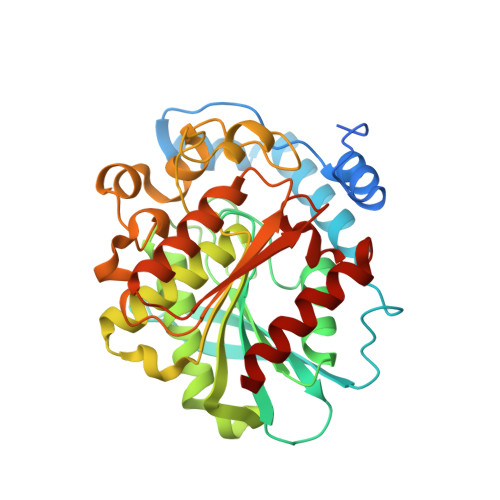Tuning the Properties of Natural Promiscuous Enzymes by Engineering Their Nano-environment.
Giunta, C.I., Cea-Rama, I., Alonso, S., Briand, M.L., Bargiela, R., Coscolin, C., Corvini, P.F., Ferrer, M., Sanz-Aparicio, J., Shahgaldian, P.(2020) ACS Nano 14: 17652-17664
- PubMed: 33306346
- DOI: https://doi.org/10.1021/acsnano.0c08716
- Primary Citation of Related Structures:
6SXP, 6SYL - PubMed Abstract:
Owing to their outstanding catalytic properties, enzymes represent powerful tools for carrying out a wide range of (bio)chemical transformations with high proficiency. In this context, enzymes with high biocatalytic promiscuity are somewhat neglected. Here, we demonstrate that a meticulous modification of a synthetic shell that surrounds an immobilized enzyme possessing broad substrate specificity allows the resulting nanobiocatalyst to be endowed with enantioselective properties while maintaining a high level of substrate promiscuity. Our results show that control of the enzyme nano-environment enables tuning of both substrate specificity and enantioselectivity. Further, we demonstrate that our strategy of enzyme supramolecular engineering allows the enzyme to be endowed with markedly enhanced stability in an organic solvent ( i.e. , acetonitrile). The versatility of the method was assessed with two additional substrate-promiscuous and structurally different enzymes, for which improvements in enantioselectivity and stability were confirmed. We expect this method to promote the use of supramolecularly engineered promiscuous enzymes in industrially relevant biocatalytic processes.
Organizational Affiliation:
Institute of Chemistry and Bioanalytics, School of Life Sciences, University of Applied Sciences and Arts Northwestern Switzerland, CH-4132 Muttenz, Switzerland.
















